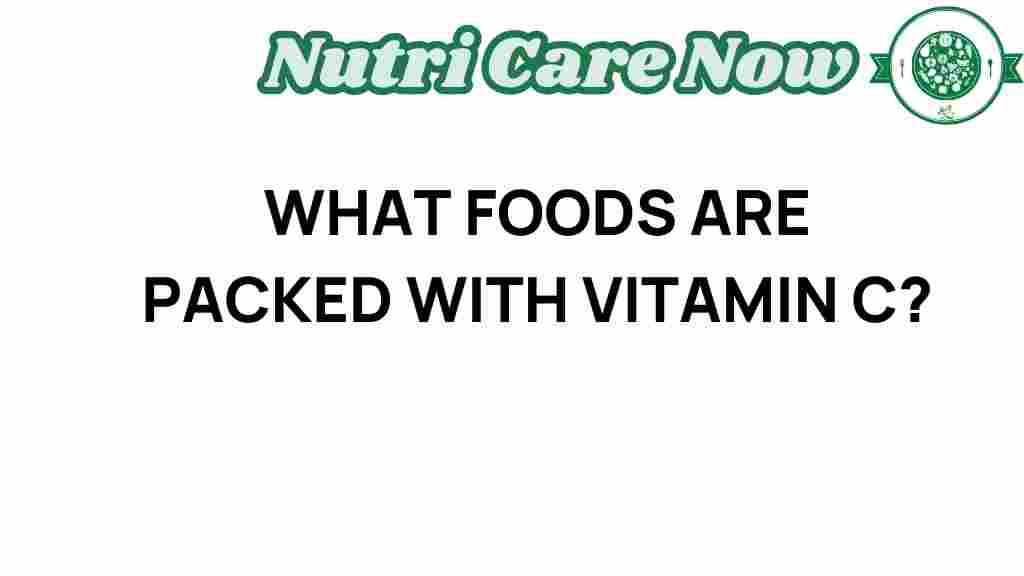Unveiling the Hidden Gems: Foods Rich in Vitamin C You Need to Try
Vitamin C is a powerful nutrient that plays a vital role in our overall health and well-being. Known for its immune support properties, this antioxidant is essential for maintaining good health. While most people associate vitamin C with citrus fruits, there are numerous other dietary sources rich in this important vitamin. In this article, we will explore a variety of delicious foods that are high in vitamin C, their health benefits, and how you can incorporate them into your diet.
The Importance of Vitamin C in Nutrition
Vitamin C, also known as ascorbic acid, is a water-soluble vitamin that acts as a potent antioxidant in the body. It helps protect cells from damage caused by free radicals, supports the immune system, and contributes to collagen production, which is essential for healthy skin, cartilage, and bones. Here are some of the key health benefits of vitamin C:
- Boosts Immune Function: Regular intake of vitamin C can help reduce the duration and severity of colds and infections.
- Supports Skin Health: Vitamin C is crucial for collagen synthesis, promoting skin elasticity and reducing signs of aging.
- Enhances Iron Absorption: It improves the absorption of non-heme iron from plant sources, which can be beneficial for those with iron deficiency.
- Reduces Chronic Disease Risk: Antioxidant properties of vitamin C help reduce the risk of chronic diseases by neutralizing free radicals.
Top Foods Rich in Vitamin C
While citrus fruits like oranges and lemons are well-known sources of vitamin C, many other foods pack a punch when it comes to this essential nutrient. Here’s a list of some hidden gems that are rich in vitamin C:
1. Berries
Berries are not only delicious but also loaded with antioxidants, including vitamin C. Here are a few notable options:
- Strawberries: A cup of strawberries contains about 85 mg of vitamin C.
- Blackberries: These berries deliver around 30 mg per cup.
- Raspberries: They offer about 30 mg of vitamin C per cup as well.
2. Leafy Greens
Leafy greens are often overlooked when it comes to vitamin C, but they are excellent sources. Consider adding these to your meals:
- Spinach: One cup of raw spinach has about 28 mg of vitamin C.
- Kale: This superfood contains approximately 80 mg of vitamin C per cup.
- Swiss Chard: It provides about 30 mg of vitamin C per cooked cup.
3. Bell Peppers
Bell peppers, especially the red variety, are among the richest sources of vitamin C. Here’s a breakdown:
- Red Bell Peppers: A single red bell pepper can contain more than 190 mg of vitamin C.
- Green Bell Peppers: These still provide a substantial amount, around 120 mg per pepper.
4. Cruciferous Vegetables
Vegetables like broccoli and Brussels sprouts are also high in vitamin C:
- Broccoli: One cup of cooked broccoli offers about 100 mg of vitamin C.
- Brussels Sprouts: These contain approximately 75 mg per cup when cooked.
5. Tropical Fruits
Tropical fruits are not just tasty; they are rich in vitamin C as well:
- Pineapple: A cup of pineapple chunks has about 80 mg of vitamin C.
- Mango: One cup of mango contains around 60 mg of vitamin C.
- Kiwi: A medium kiwi provides about 71 mg of vitamin C.
Incorporating Vitamin C-Rich Foods into Your Diet
Now that you know about these vitamin C-rich foods, here are some practical tips for incorporating them into your daily meals:
- Start Your Day with Smoothies: Blend spinach, kiwi, and berries for a nutritious breakfast.
- Add Bell Peppers to Salads: Toss in chopped bell peppers for a crunchy, colorful addition.
- Snack on Fruits: Keep fresh fruits like oranges, strawberries, and mangoes handy for a quick snack.
- Cook with Broccoli and Brussels Sprouts: Add them to stir-fries or steam them as a side dish.
Troubleshooting Tips for Maximizing Vitamin C Intake
While it’s essential to include vitamin C-rich foods in your diet, certain factors can affect nutrient retention. Here are some tips to ensure you get the most vitamin C possible:
- Avoid Overcooking: Vitamin C is sensitive to heat. Cook vegetables lightly to preserve their nutrients.
- Store Properly: Keep fruits and vegetables in a cool, dry place and consume them fresh for maximum vitamin C content.
- Limit Processing: Processed foods often have reduced levels of vitamin C. Aim for whole foods whenever possible.
Conclusion
Vitamin C is a crucial nutrient that provides numerous health benefits, from boosting your immune system to supporting skin health. While citrus fruits are commonly recognized as a primary source, many other foods, such as berries, leafy greens, and tropical fruits, are also rich in this essential vitamin. By incorporating a variety of these foods into your diet, you can ensure you’re getting enough vitamin C to support your overall health.
So why not explore the vibrant world of vitamin C-rich foods today? Try adding these hidden gems to your meals and enjoy the delicious flavors while reaping the health benefits they offer. For more information on nutrition and health benefits, check out this comprehensive guide.
Remember, a balanced diet filled with a variety of fruits and vegetables is key to optimal health. Start today and embrace the power of vitamin C!
This article is in the category Diet and created by NutriCareNow Team
